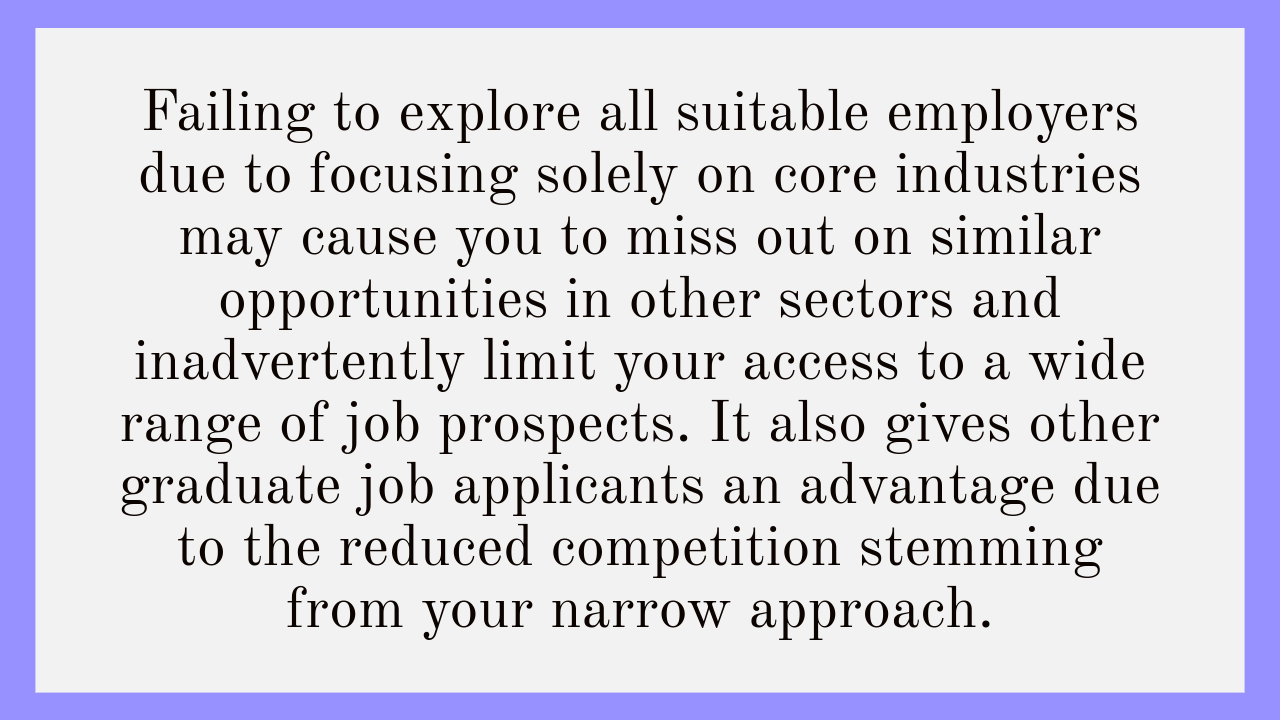Only Focusing on Core Industries Gives Your Competitors an Advantage
Adding sub-industries to the mix is a smarter approach
This post explains why only focusing on applying to graduate employers whose core industry matches the business area you're interested in is like leaving money on the table and why it could potentially give your competitors an advantage.
This post is part of the first step of the 10-step guide to creating a strategic list of employers to target for graduate jobs. The first step provides subscribers with a list of 150+ top graduate employers across various industries and information on the approximate number of vacancies these employers have reserved for students and recent graduates. For additional posts related to this first step, click here and here.
Remember that company that rejected your job application despite your strong CV? This newsletter will show you what probably happened.
Welcome to Keep, Ding, Ghost! A (roughly) weekly newsletter and podcast that provides feedback to graduate job applicants through FREE CV reviews.
Founder/Author: L. C. Serrão
Click here for FAQs. Click here for the Master Index.
Hey, guys! A significant portion of graduate job applicants still choose to select which employers to target for graduate jobs based only on their ‘core’ industry. For example, some aspiring accountants and law students only apply for graduate jobs at accounting or law firms.
Such an approach is ill-advised.
Exploring roles in different industries can open up exciting job opportunities that align with your interests, even if they're not in the core industry. For instance, some investment banks offer accounting and legal trainee contracts to students and recent graduates. So you could obtain the ACA qualification and become a chartered accountant through, say, Goldman Sachs, one of the world’s most prestigious banks.
Goldman Sachs’ core industry is investment banking. In the example above, this newsletter considers accounting a sub-industry for Goldman Sachs because it provides graduate job opportunities (i.e., insight programs, internships or full-time graduate roles) to aspiring accountants. If accounting-related graduate job opportunities were not provided, this newsletter would not categorise accounting as a sub-industry for Goldman Sachs, regardless of whether it has an accounting department. The same applies to other employers and core/sub-industries. Essentially, this newsletter defines a 'sub-industry' as a business area, other than an employer’s core industry, that provides graduate job opportunities.
The Goldman Sachs example illustrates that core industries are not the only route to specific career paths; similar opportunities exist in sub-industries. Imagine being a lawyer at Disney (a media company) or part of the mergers and acquisitions (M&A) team at Google (a tech company). These are highly respected and appealing roles that shouldn't be overlooked.
So, when you're searching for graduate job opportunities, avoid putting all your eggs in core industries. Make sure you also hunt for opportunities provided by sub-industries.
Despite this advice, some graduate job applicants will stick to their position of only applying to core industries. And hey, if so, that’s great for you because their lack of awareness about the opportunities available in sub-industries (or their naivety in not taking such opportunities seriously) will leave openings for you to capitalise on.
Still not convinced it really is that important to consider sub-industries? Okay. Let's take a look at the following scenario as an example.
Let’s assume you’re targetting a graduate job within the field of accounting. The Google Sheet I previously shared with the list of 150+ top graduate employers includes eight employers (at the time of publication) whose core industry has been tagged as ‘Accounting & Professional Services’. This consists of the Big Four accounting firms and others you may or may not have heard of before.
So, if you only apply to these eight, you’d have eight applications within one core industry.
Suppose you decide to also consider employers in other industries who have indicated that they also offer ‘Accounting & Professional Services’ graduate job opportunities. In the same Google Sheet, you’d find eight additional employers (at the time of publication). And these eight additional employers represent six different core industries, ranging from engineering/industrial to media.
So, where you were previously planning to apply to eight graduate employers within the same core industry, you could now apply to 16 graduate employers across seven industries (accounting + six other industries).
That’s diversification, baby.
If one industry has a crisis, or if it simply doesn't work out with the core industry applications, you could still have six other industries to lean on (#micdrop).
At this point, the court records show that this post has convincingly articulated the strategic importance of considering a graduate employer’s sub-industry when job hunting. Doing so provides a smarter approach for identifying suitable graduate job opportunities and diversifying your applications, potentially giving you a competitive edge over other applicants.
If you still have doubts about the importance of taking sub-industries into account, I wish you the best in all your future endeavours, lol.
There’s an additional reason why I don’t recommend solely focusing on core industries. I’ll illustrate it by asking you the following:
What is Mercedes Benz’s core industry? Luxury Goods? Automotive? Engineering?
What about Amazon? Retail? Tech? Space Tourism?
If you struggled, you’re not alone. Defining a company's core industry is not always straightforward. Companies can be complex, engaging in different ‘core’ activities associated with various ‘core’ industries.
Depending on the source used, the complexity of industry classifications can result in different categorisations for the same company. For instance, it could be argued that, except for the option intended as a joke, each of the previously provided options for describing Mercedes Benz and Amazon’s core industries is reasonable (and would make for an interesting debate).
Consequently, focusing exclusively on the core industry assigned by a specific source could result in you excluding other suitable target graduate employers if the source has labelled it as belonging to a different core industry—further highlighting the importance of considering multiple industries.
Identifying sub-industries can also be challenging, as companies often operate in multiple business areas. One way of going about this is by going through an employer's website. But there are hundreds of graduate employers. So, a more efficient way of going about this would be to start by going through the list of the top 100 UK graduate employers provided by The Times and making a note of all the industries that The Times lists as being associated with each graduate employer.
Below is one example of the results you’d get using this method.
By checking which industries The Times associates with specific employers in their top 100 UK graduate employers list, you’d find that Airbus, a leading aerospace company that manufacturers the planes many of you have boarded when going on holidays, is linked to the following industries:
Engineering & Industrial
Finance
IT, Telecoms & Technology
Logistics
Marketing
Purchasing
Research & Development
This provides you with a good indication of the type of business areas in which Airbus provides graduate job opportunities.
When I was an undergrad at Imperial College, I am pretty sure I did not hesitate to exclude companies like Airbus from my list of employers to target for graduate jobs. It probably went something like this:
Airbus? The company that makes planes?? But I don’t want to make planes…..I’m not an engineer…..I want to work in finance or consulting or something like that….so, nope. Next employer!
I am certain I didn’t even visit Airbus’ career website.
I just assumed they wouldn’t offer graduate jobs in the business areas I was keen on.
But finance is included in the list above showing the industries associated with Airbus!
As I had associated Airbus only with its core industry, I didn’t realise there were other areas of the company that I could be interested in. So, by not doing my homework, I limited my own opportunities by opting out of the process (which reduced the competition for other applicants).
While I managed to get internships in investment banking (with Goldman Sachs and Morgan Stanley), which I highly recommend, who knows what could have happened had I managed to get a job with Airbus?! I could have been flying around the world for free by now, lol.
And what if I hadn’t managed to get an internship? Knowing me, I would have probably issued some of the blame on a ‘lack of’ opportunities. Cheeky, considering I snubbed graduate employers like Airbus without trying to understand the different graduate job opportunities they offer...
The moral of the story is: Don’t judge a graduate employer by its core industry.
Find out what their sub-industries are. Then you can judge them, lol.
All jokes aside, make sure you do identify an employer’s sub-industries.
It is an invaluable strategy that the strongest graduate job candidates will exploit.
Make sure you’re one of them.
Updated Google Sheet
Going through every employer's website to identify sub-industries or making a note of all the industries that The Times lists as being associated with each graduate employer can be time-consuming, but it will be time well spent.
If you're a premium subscriber to this newsletter, I've done the hard work for you!
I’ve made a list on Google Sheets of all the industries associated with not only the top 100 UK graduate employers provided by The Times but also the 50+ additional top graduate employers named in the list curated by Keep, Ding, Ghost (i.e., me).
For each employer, the list also includes whether a specific industry is considered a core or sub-industry. So, it provides the names of all the employers offering graduate job opportunities in the business areas you're interested in, irrespective of whether that business area is considered a core industry or a sub-industry. This will give you a more accurate picture of the number of graduate job opportunities available and help you avoid making the same mistakes I made when I regretfully misjudged graduate employers like Airbus.
All this information has been added to the Google Sheet version of the 150+ top graduate employers list provided in the previous post.
To access the Google Sheet, click here.
You’ve reached the end of this post—thanks for reading! I appreciate your time and interest!
Read/Learn More:
🔗10-step guide to creating a strategic list of employers to target for graduate jobs
🔗Enclosed: 150+ top graduate employers
🔗BONUS: Google Sheet version of the 150+ top graduate employers list
💬 Question Time:
Which industries or business areas are you most keen on? Please let me know in the comment section. I would love to hear from you!
💬 Here’s My Answer:
I knew very little about different industries when I was first applying for graduate jobs. I pretty much believed the only respectable jobs were doctors, lawyers, or accountants, and I didn’t even know you could do the latter two in different industries (i.e., sub-industries). So, at first, I targeted accounting firms. Later, as I learned about other industries and core/sub-industries, my targets developed until I finally decided that my top two target industries were investment banking and consulting—in that order. And as you know (if you read this post), I ended up completing my full-time Analyst program (following internships) in investment banking at Morgan Stanley.
One More Thing:
If you enjoy this newsletter/podcast, there are several ways to let me know: 'like' this post, leave a comment, share this post, restack your favourite section of it (or the entire post), or become a premium subscriber (which you could potentially upgrade to for FREE).
✨Additionally, if you’d like to win a 1:1 virtual session with me to discuss recruitment-related topics such as your CV, cover letter, or interview, click here!













